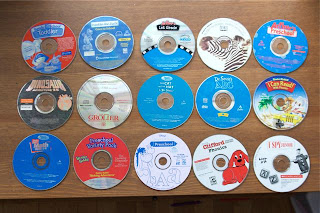I've used GrandCentral and GrandDialer for months to call Canada free of charge. That alone paid for my iPhone's data service.
I didn't use any other GrandCentral features, mostly because they didn't seem that impressive.
Turns out, I was missing quite a bit. David Pogue, who's name is a hallmark for excellence in technology writing, fills in a heck of a lot of the gaps today. Read the entire article (emphases mine).
One thing Pogue diplomatically omits is that if you put your GC number on your business card your number will follow you even after you turn in your corporate cell phone ...
State of the Art - Unify the Phone Numbers and All Else Follows - Pogue - NYTimes.com
... Google Voice began life in 2005 as something called GrandCentral...GrandCentral’s solution was to offer you a new, single, unified phone number, in an area code of your choice. Whenever somebody dialed your uni-number, all of your phones rang at once...
... Each time you answered a call, while the caller was still hearing “one ringy-dingy, two ringy-dingies,” you heard a recording offering four ways to handle the call ... This subtle feature saved time, conserved cellular minutes and, in certain cases, avoided a great deal of interpersonal conflict.
GrandCentral also let you record a different voice mail greeting for each person in your address book..
... You could also specify which phones would ring when certain people called. ...you could even tell GrandCentral to answer with the classic, three-tone “The number you have dialed is no longer in service” ...
... Any time during a call, you could press the * key to make all of your phones ring again, so that you could pick up on a different phone in midcall. If you were heading out the door, you could switch a landline call to your cellphone.
GrandCentral also offered telemarketing spam filters, off-hour call blocking (“never ring my BlackBerry on weekends”), and a dizzying number of other functions...
... Google Voice starts with a clean, redesigned Web site that looks like an in-box, à la Gmail. It maintains all of those original GrandCentral features — but more important, introduces four game-changing new ones.
FREE VOICE MAIL TRANSCRIPTIONS ... the Web site displays transcribed words more faintly (light gray) when it is less confident about the transcription. Fortunately, it generally nails numbers — phone numbers, arrival times, addresses...
FREE CONFERENCE CALLING ...
... DIRT-CHEAP INTERNATIONAL CALLS If you dial your own Google Voice number from one of your phones, you’re offered an option to call overseas at rates even lower than Skype’s (and much lower than your cellphone company’s): 2 cents a minute to France or China, 3 cents to Chile or the Czech Republic. Sweet.
TEXT MESSAGE ORGANIZATION .. Google Voice, however, does the right thing: it sends text messages to whichever cellphones you want — even multiple phones simultaneously.
Even more important, it collects them in your Web in-box just like e-mail. You can file them, search them and, for the first time in cellphone history, keep them. They don’t vanish forever once your cellphone gets full.
You can also reply to them with a click, either with a call or another text; your back-and-forths appear online as a conversation.
... You can, if you wish, turn off that “press 1, press 2” option, so when the phone rings, you can just pick it up and start talking. Google has also done some Googlish integration; for example, your Gmail and Google Voice address books are the same.
... As a side effect of Google Voice’s ring-all-phones-at-once technology, you sometimes find fragments of Google Voice error recordings on the answering machines of the phones you didn’t answer. (Solution: make your voice mail greeting at least 15 seconds long.) There’s a learning curve to all of this, too...
The downside for me? Now I have to pay for my calls to Canada. Still, a great bargain.
I LOVE the address book integration. I'm looking forward to Google's iPhone client, which is pretty much a sure thing.
And whey they add Google Video Chat and Gmail integration ...
I wonder what the phone companies did to piss off Google.
Update: Never fails. As of this moment GrandCentral isn't recognizing my un/pw. It worked this morning. Since I had a gmail account for email and a spamcop.net username I have a bad feeling about where the bug is.
Update: I guessed right about the bug, so I was able to fix it. The account info page on GC still shows my old username, it just doesn't work any more.
Apple had a similar problem recently. I wonder if this has any intersection with a recent Google bug that transiently locked me out of my entire Google identity!
Update 3/13/09: Some mobile phone plans have unlimited calling for 'friends and family' numbers. So if the GrandCentral number is 'friend and family' ...

